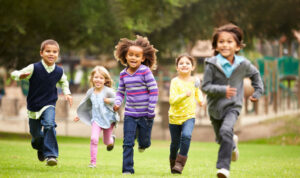Blog Post by Gina Hernandez, MA, LPC, CCTP – Executive Director
Prevent Child Abuse-New Jersey and Child Wellness Institute (ChildWIN®)
In 2018 … in a preschool classroom in Camden, an urban New Jersey city, a group of parents sat in child-sized chairs facing each other. It was quiet as people were looking around, waiting to hear what we were going to talk about. The children were in the next room embarking on nap time.
The presentation started on a common ground. We talked about stress: the stress of parenting, the stress of life. And then, after moments of vulnerability and truth talk, we began to talk about trauma. We talked about ACEs (Adverse Childhood Experiences.) We discovered that so much about how we see the world and how we parent our children is impacted by how we were raised. For the 19 parents in the group, the experience was life changing. “This was the first time anyone really acknowledged what I went through as a kid. It was really powerful and eye opening,” said one parent of a 3-year-old boy. Another parent stated, “I am stunned. This is going to help me be a better parent.”
We moved into an activity about our brains, how they are wired and what triggers us. Together, we built a brain out of yarn to illustrate how both Positive Childhood Experiences (PCEs) and ACEs shape us. We then explored how our brains react under stress.
There were laughs and some tears, and the human side of all of us emerged. We talked about how our parents or family raised us (or in some cases didn’t raise us.) The parents stayed for an hour after the workshop ended. Then an email arrived in my inbox. It was from the preschool. It read “the parents want another workshop and are telling friends about it.”
With funds from a small grant, we offered another workshop and a five-part series for their teachers, security officers, lunch aides- anyone who would be in contact with children. We called it the Trauma Transformation Initiative (TTI). The results from this pilot demonstrated that teachers increased their confidence in the classroom when managing challenging behaviors, but the staff also reported that the number of challenging behaviors had reduced.
That was August 2018. Since then, the Child Wellness Institute (ChildWIN®) has hosted workshops for hundreds of parents, thousands of children and more than 6,000 professionals. ChildWIN® has also added a Peaceful Practices component specifically designed for the children and a Peaceful Practices for Parent/Child.
When someone asks us about “training” we offer, I often pause. Not because we do not offer training, but because the term training implies we are going in, teaching something new and then leaving, expecting that maybe our participants learned something new, without forming a relationship that encourages growth and change. That is not how transformation works. It is a process we go through, in our own time, when we are ready to accept information, digest it and think about how to apply it. Sometimes it takes months, sometimes years. And for a school or organization to transform, well, it is not simply a one-time training.
ChildWIN® then piloted TTI in a suburban preschool with the same results. Parents were fascinated and wanted more. It created a new lens for how they see their children and also how they see themselves. And, the teachers were all on board! Their practices shifted toward being trauma-informed, trauma-sensitive and toward healing for EVERY child, not just those suspected of having experienced trauma.
To date, TTI has transformed before/after school programs and individual elementary schools. In 2019, ChildWIN® began working with two entire districts in Middlesex and Mercer County, New Jersey and has been asked to begin work in several other counties as well. This time things are different, though. We are still in a pandemic and most children are entering a school, not having been in a classroom for nearly two years. Others, entering second grade, may have never been in a classroom.
Initial results show the administrators are noticing a change, right from the beginning, in how teachers respond to children after attending the first phase of TTI. During the first step to the journey, the teachers report, that although stressed, they now better understand how trauma can impact themselves and their students.
Stay tuned for the results of the next phase as we look at TTI’s impact on the children and teachers as they continue on during the pandemic. We will be assessing impact to measure changes.
We have completed three years of doing this work, with countless relationships built. This is the measure that seems to matter the most. Relationships in our communities, in our schools and with each other are what connects us and helps us heal.




